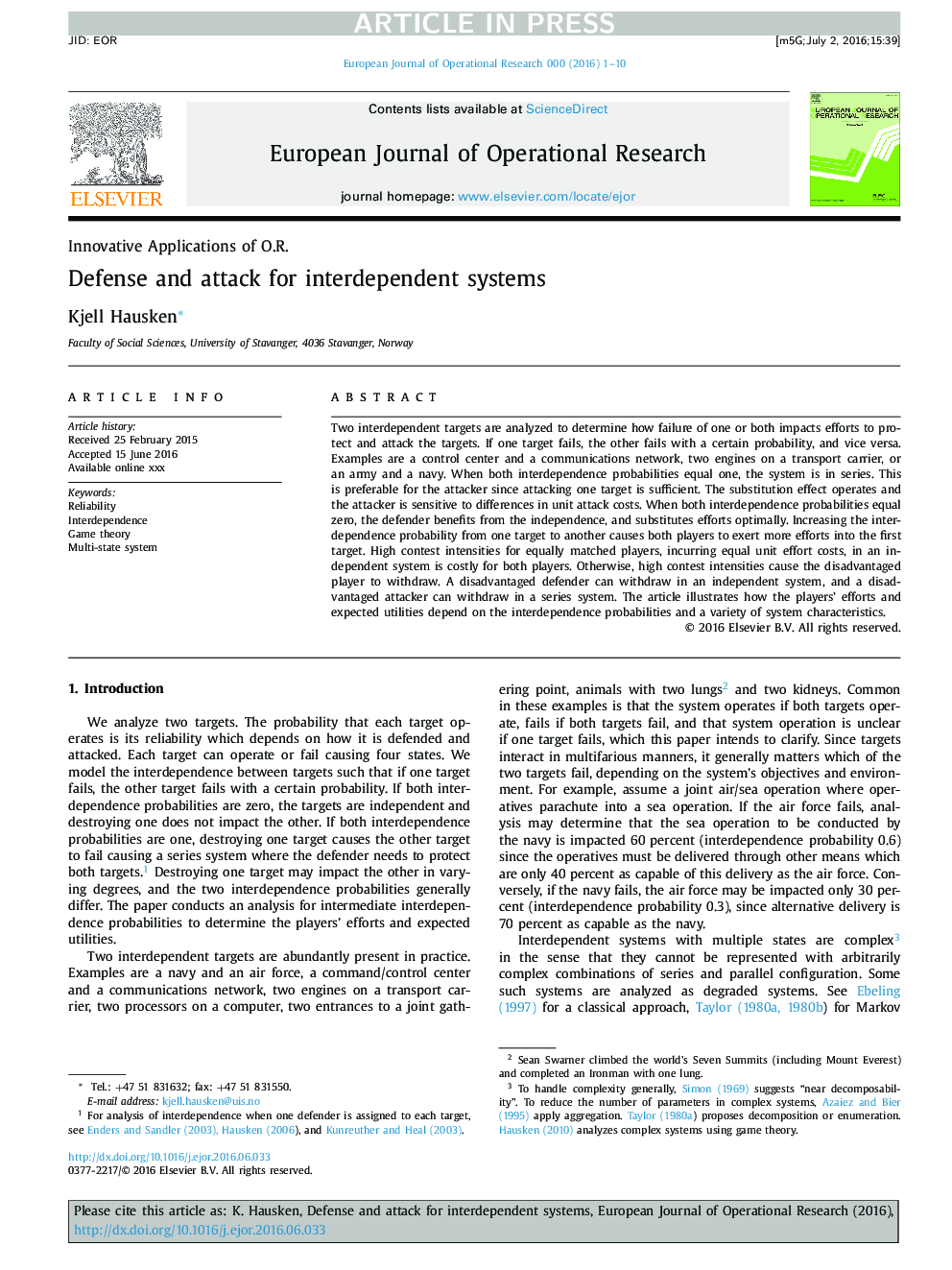| کد مقاله | کد نشریه | سال انتشار | مقاله انگلیسی | نسخه تمام متن |
|---|---|---|---|---|
| 4960230 | 1445968 | 2017 | 10 صفحه PDF | دانلود رایگان |
عنوان انگلیسی مقاله ISI
Defense and attack for interdependent systems
ترجمه فارسی عنوان
دفاع و حمله به سیستم های وابسته به یکدیگر
دانلود مقاله + سفارش ترجمه
دانلود مقاله ISI انگلیسی
رایگان برای ایرانیان
کلمات کلیدی
قابلیت اطمینان، وابستگی متقابل، نظریه بازی، سیستم چند دولتی،
ترجمه چکیده
دو اهداف متقابلی برای تعیین اینکه چگونه شکست یک یا هر دو بر تلاش برای حفاظت و حمله به اهداف مورد بررسی قرار می گیرد، تحلیل می شود. اگر یک هدف ناکام بماند، دیگر با احتمال خاصی روبرو می شود و برعکس. مثلا یک مرکز کنترل و یک شبکه ارتباطی، دو موتور در یک حامل حمل و نقل، و یا ارتش و نیروی دریایی است. وقتی هر دو احتمالات وابستگی به هم برابر باشند، سیستم در مجموعه قرار دارد. این برای مهاجم بهتر است زیرا حمله به یک هدف کافی است. اثر جایگزینی عمل می کند و مهاجم به تفاوت در هزینه های حمله واحد حساس است. زمانی که هر دو احتمال وابستگی به هم برابر صفر باشند، مدافعان از استقلال بهره مند می شوند و تلاش های جایگزین را بهینه می کنند. افزایش احتمال وابستگی متقابل از یک هدف به دیگری موجب می شود که هر دو بازیکنان تلاش بیشتری برای هدف اول انجام دهند. شدت رقابت بالا برای بازیکنان به طور مساوی، با هزینه های یکسانی تلاش یکسانی، در یک سیستم مستقل هزینه برای هر دو بازیکن است. در غیر این صورت، شدت رقابت بالا باعث می شود بازیکنان محروم از بین بروند. یک مدافع محروم می تواند در یک سیستم مستقل عقب نشینی کند و یک مهاجم محروم می تواند در یک سیستم سری به عقب برود. این مقاله نشان می دهد که چگونه تلاش ها و خدمات مورد انتظار بازیکنان به احتمال احتمالات وابستگی و ویژگی های مختلف سیستم بستگی دارد.
موضوعات مرتبط
مهندسی و علوم پایه
مهندسی کامپیوتر
علوم کامپیوتر (عمومی)
چکیده انگلیسی
Two interdependent targets are analyzed to determine how failure of one or both impacts efforts to protect and attack the targets. If one target fails, the other fails with a certain probability, and vice versa. Examples are a control center and a communications network, two engines on a transport carrier, or an army and a navy. When both interdependence probabilities equal one, the system is in series. This is preferable for the attacker since attacking one target is sufficient. The substitution effect operates and the attacker is sensitive to differences in unit attack costs. When both interdependence probabilities equal zero, the defender benefits from the independence, and substitutes efforts optimally. Increasing the interdependence probability from one target to another causes both players to exert more efforts into the first target. High contest intensities for equally matched players, incurring equal unit effort costs, in an independent system is costly for both players. Otherwise, high contest intensities cause the disadvantaged player to withdraw. A disadvantaged defender can withdraw in an independent system, and a disadvantaged attacker can withdraw in a series system. The article illustrates how the players' efforts and expected utilities depend on the interdependence probabilities and a variety of system characteristics.
ناشر
Database: Elsevier - ScienceDirect (ساینس دایرکت)
Journal: European Journal of Operational Research - Volume 256, Issue 2, 16 January 2017, Pages 582-591
Journal: European Journal of Operational Research - Volume 256, Issue 2, 16 January 2017, Pages 582-591
نویسندگان
Kjell Hausken,
